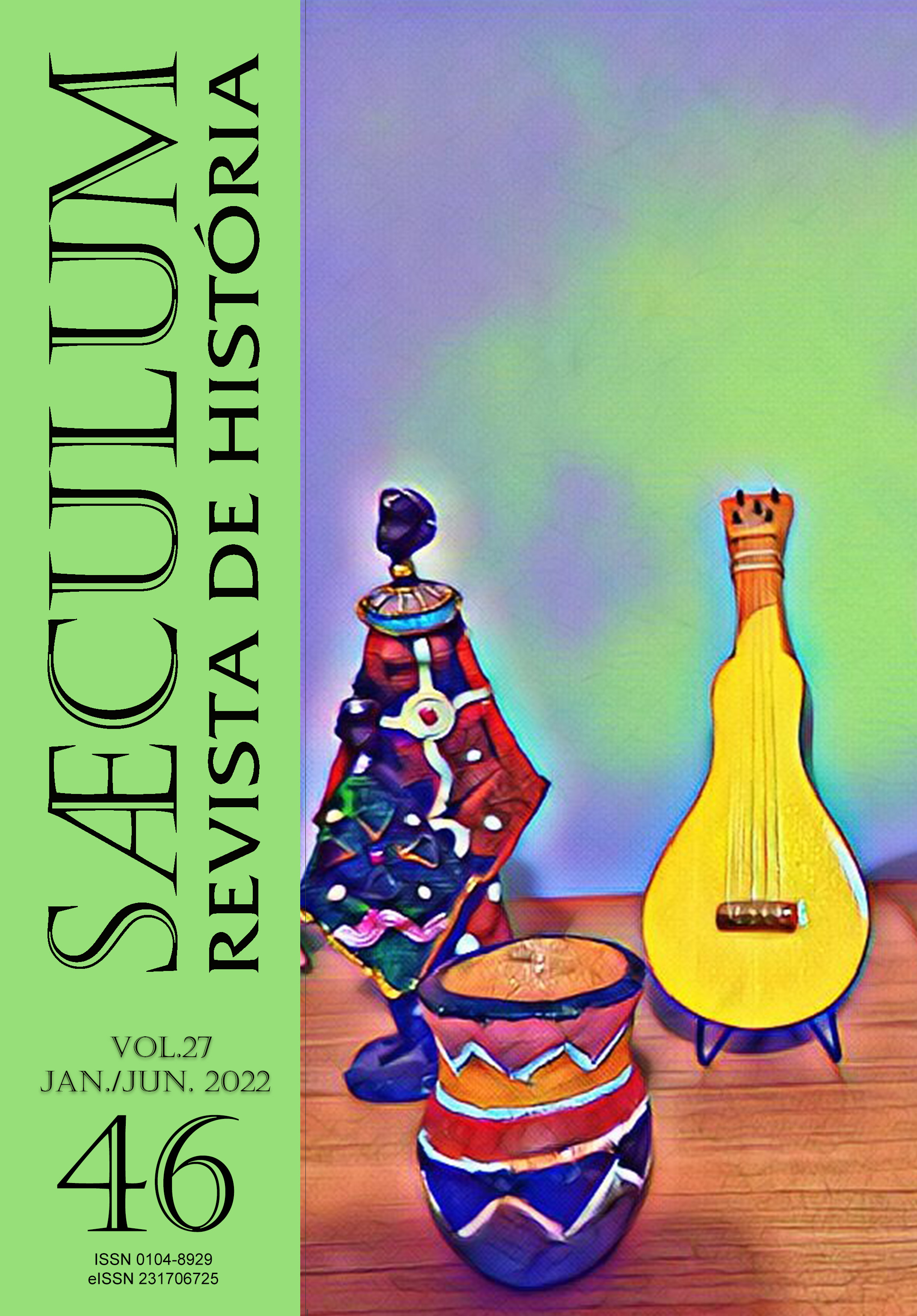Memory, cultural heritage, and educational processes: Dialogues and historical reflections
DOI:
https://doi.org/10.22478/ufpb.2317-6725.2022v27n46.63264Keywords:
cultural heritage, identity, diversity.Abstract
The relationships between memory, cultural heritage and educational processes have been problematized by the contemporary emergence of demands and positions for the defense of citizenship, democracy, decoloniality, the environment, female protagonism and the ethical and humanized use of digital technologies. Even though institutions for the safeguarding of cultural heritage, Brazilian and international, are responsible for an epistemological aspect that brings together multiple fields of knowledge, dialogues and historical reflections carried out by students, researchers, heritage educators and cultural managers who have traced different and collaborative cultures in deconstruction of hierarchies and eurocentrisms. Or thinking about the heritage, while working with the communities that we recognize and produce, teaches us to plan the educational processes that deal with the material and material inheritances with which we coexist. Thus, a myriad of possibilities allow teacher training in practical classrooms of history and cultural heritage; the processes of teaching-learning and conservation of a geopark as a natural and cultural heritage; a lexicography of a technological museum as an institution; to learning and historical awareness by visiting local and regional museums; or affective cultural heritage of women's memories about a city; the agencies of black subjects in the development of afro-diasporic memories in museums; or worship of ancestors, religion and Japanese temple as cultural heritage and the pedagogical aspects of material culture through memorials and school archives. An ecology of knowledge to happen or heart in sensitive times.
Downloads
References
BRASIL. Constituição da República Federativa do Brasil. DF/Brasília: Câmara Legislativa, 1988. Disponível em:https://www2.camara.leg.br/legin/fed/consti/1988/constituicao-1988-5-outubro-1988-322142-publicacaooriginal-1-pl.html, acesso em: 20/05/2022.
BUTTERS, Luis Jaime Castillo. Arqueología desde el aire. Drones y modelos 3D en el registro y la gestión del patrimonio cultural. Gaceta Cultural, n° 46. Lima: Ministerio de Cultura, p. 02-07, 2014.
CHUVA, Márcia. Patrimônio Cultural em perspectiva decolonial: historiando concepções e práticas. In: DUARTE, Alice (ed.) Seminários DEP/FLUP, vol. 1. Porto: Universidade do Porto, Faculdade de Letras/DCTP, 2020, p. 16-35. Disponível em: https://doi.org/10.21747/9789898969682/seminariosv1a1, acesso em: 10/05/2022. DOI: https://doi.org/10.21747/9789898969682/seminariosv1a1
DEMARCHI, João Lorandi. O que é, afinal, a educação patrimonial? Uma análise do Guia Básico de Educação Patrimonial. Revista CPC, vol. 13, n. 25, p. 140-162, 2018. Disponível em: https://doi.org/10.11606/issn.1980-4466.v13i25p140-162, acesso em: 30/05/2022. DOI: https://doi.org/10.11606/issn.1980-4466.v13i25p140-162
GONÇALVES, José Reginaldo S. A retórica da perda: discurso nacionalista e patrimônio cultural no Brasil. Rio de Janeiro: Editora da UFRJ, 2002.
GONÇALVES, José Reginaldo Santos. O patrimônio como categoria de pensamento. In: ABREU, Regina; CHAGAS, Mário (orgs.). Memória e patrimônio: ensaios contemporâneos. Rio de Janeiro: Lamparina, 2009, p. 25-33.
HARTOG, François. Tempo e patrimônio. Varia Historia, Belo Horizonte, vol. 22, n. 36, p. 261-273, 2006. DOI: https://doi.org/10.1590/S0104-87752006000200002
HORTA, Maria de Lourdes Parreiras; GRUNBERG, Evelina; MONTEIRO, Adriane Queiroz. Guia de Educação patrimonial. Brasília: IPHAN, 1999.
IIT - ISTITUTO ITALIANO DI TECNOLOGIA. AI and satellite images come together to discover hidden archaeological sites. EurekAlert!, 26/03/2021. Disponível em: https://www.eurekalert.org/news-releases/522399, acesso em: 20/05/2022.
IPHAN - INSTITUTO DO PATRIMÔNIO HISTÓRICO E ARTÍSTICO NACIONAL. Educação Patrimonial. Histórico, conceitos e processos. Brasília: CEDUC/IPHAN, 2014.
IPHAN - INSTITUTO DO PATRIMÔNIO HISTÓRICO E ARTÍSTICO NACIONAL. Programa Nacional do Patrimônio Imaterial (PNPI). Brasília: IPHAN, 2001.
MARTINS, Cesar Eugenio Macedo de Almeida; BARACHO, Renata Maria Abrantes. Tecnologia e interação: os museus no contexto das novas formas de expor e comunicar. Revista Museu, 18/05/2018. Disponível em: https://www.revistamuseu.com.br/site/br/artigos/18-de-maio/18-maio-2018/4743-tecnologia-e-interacao-os-museus-no-contexto-das-novas-formas-de-expor-e-comunicar.html, acesso em: 20/05/2022.
PELEGRINI, Sandra de Cássia Araújo. Patrimônio Cultural: consciência e preservação. São Paulo: Brasiliense, 2009.
PIERRE-LOUIS, Loudmia Amicia; LIMA, Bárbara Ferreira de; EID, Félix Ceneviva. A (de)colonialidade do patrimônio na América Latina: lugares do negro e do indígena no caso brasileiro e argentino. RELACult - Revista Latino-Americana de Estudos em Cultura e Sociedade, vol. 5, art. n° 1496, ed. especial, 2019, p. 01-15. DOI: https://doi.org/10.23899/relacult.v5i5.1496
RÜSEN, Jörn. Cultura faz sentido. Orientações entre o ontem e o amanhã. Petrópolis: Vozes, 2014.
SALCEDO, Rosio Fernández Baca. Análise crítica das obras envolvendo os diálogos da habitação social em centros históricos. Vol. 1. Tese de Livre Docência. Bauru: Faculdade de Arquitetura, Artes e Comunicação/ UNESP, 2019.
SANTOS, Boaventura de Sousa. Para além do pensamento abissal: das linhas globais a uma ecologia de saberes. Novos estud. CEBRAP, vol. 79, p. 71-94, 2007. DOI: https://doi.org/10.1590/S0101-33002007000300004
TOLENTINO, Átila Bezerra. Educação patrimonial decolonial: perspectivas e entraves nas práticas de patrimonialização federal. Sillogés, vol. 1, n. 1, p. 41-60, 2018.
ZANIRATO, Silvia Helena. O patrimônio natural do Brasil. Projeto História, PUC-SP, vol. 40, p. 127-145, 2010.
Downloads
Published
How to Cite
Issue
Section
License
Copyright (c) 2022 Janaína Cardoso de Mello, Jaqueline Aparecida Martins Zarbato

This work is licensed under a Creative Commons Attribution-NonCommercial 4.0 International License.
A revista Sæculum permite aos autores a manutenção dos direitos autorais pelo seu trabalho, no entanto eles devem repassar direitos de primeira publicação ao periódico.











